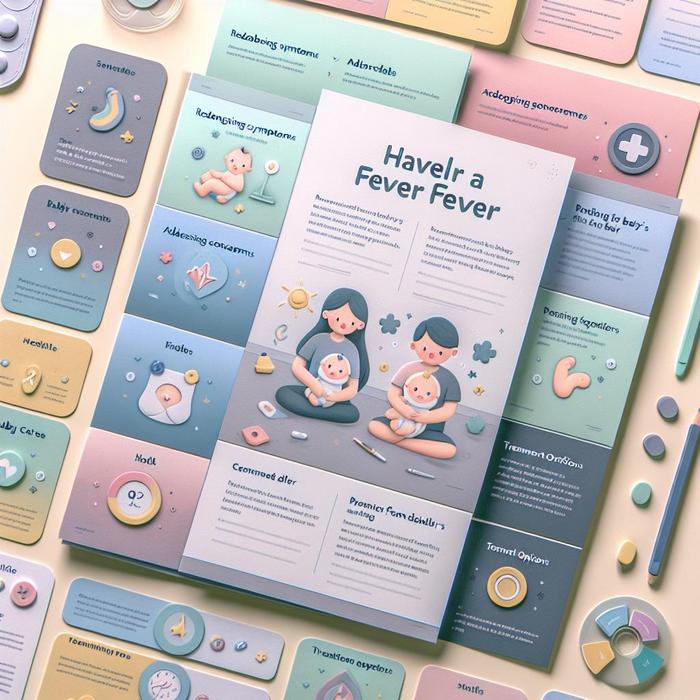Managing Fever in Babies: Recognizing and Addressing the Symptoms
As any parent knows, caring for a sick baby is a nerve-racking experience. Your little one can’t communicate with words, making it difficult to understand what’s going wrong. When your baby has their first fever, your natural instinct may be to panic. But don’t fear. We’re here to guide you with advice from our personal experience.
Recognizing Symptoms of Fever in Babies
Your baby’s usual behavior can provide clues to their health status. A change in temperament, such as increased irritability or reductions in the baby’s activity level, can be a sign of illness. Other symptoms might include a hot forehead, unusual sleep patterns, or decreased appetite.
It’s essential to get an accurate measurement of your baby’s temperature. Rectal thermometers are recommended for infants due to their accuracy. A reading over 100.4°F (38°C) is considered a fever. Make sure you consult your pediatrician when your baby has a fever, especially if they’re younger than three months old. We used this guideline when we went through this experience, and it provided us with peace of mind.
For more information on recognizing other symptoms, check out this post on southdaleobgyn.com.
Addressing Concerns and Seeking Medical Help
The challenging part of managing fever in babies isn’t so much the fever itself, but addressing the root cause. Fever is just the body’s reaction to an underlying issue, such as an infection.
For fevers related to regular vaccines, mild fevers are a common response. However, if your baby’s fever persists for more than a couple of days, it’s important to seek medical attention. The Children’s Hospital of Philadelphia provides great information about this.
In some cases, a fever can be a sign of a severe condition such as sepsis. Understanding sepsis signs is crucial, as early treatment can prevent serious complications.
Treatment Options for Baby’s First Fever
While fever in babies can be alarming, it’s treatable in most cases. Here are some tips to help:
– Keep your baby hydrated: This can help lower a fever and prevent dehydration.
– Dress your baby lightly: Overbundling can cause the baby’s body temperature to rise.
– Give doctor-recommended fever medicine: Never give your baby medication without a doctor’s recommendation.
Whatever the root cause, it’s crucial to monitor your baby’s fever and ensure it doesn’t rise too high.
The Emotional Roller Coaster
Managing fever in babies isn’t just a physical process, it’s also an emotional journey. You might find it overwhelming, especially when it’s your baby’s first fever. Sharing our experiences and tips has always been part of our journey as parents, which you can read about in this Mom Natural post.
Meanwhile, more and more parents are turning to entertainment platforms like Netflix to find relatable content about parenthood. The Danish series, “Baby Fever” beautifully encapsulates the various challenges and joys of becoming parents.
Remember, you’re not alone in this journey. It’s okay to feel overwhelmed sometimes. And when it becomes too much, don’t hesitate to seek professional help or lean on your support network.
Fever Related to Vaccination
An often overlooked source of fever in young children is vaccines. Most vaccines commonly given to babies can sometimes cause a fever. This is a standard part of the child’s response to the vaccine as it is instructing the immune system to fight off the disease. According to the Center for Disease Control, most vaccine-related fevers are mild and short-lived. However, knowing this can still bring comfort and reassurance when you are worried about your baby’s well-being.
Effect of Fever on Babies
We know that fever in babies is generally seen as an indicator of an underlying issue. But it’s also crucial to understand how the baby is responding to the illness. Sleep patterns may alter, with babies showing signs of exhaustion or, conversely, showing restlessness and an inability to sleep. Changes in eating patterns are also likely, with babies possibly refusing their regular volumes of milk or solids. It’s not unusual during these times for babies to be grizzly and cry more than usual, which can be particularly distressing to new parents.
Monitoring Temperatures Regularly
Maintaining a watchful eye on your baby’s temperature is crucial during times of fever. Regular monitoring helps determine whether the fever is improving, remaining stable, or deteriorating. You might be compelled to take your baby’s temperature continuously, but remember to avoid causing unnecessary discomfort or disturbance. It’s more beneficial to observe their behavior, comfort, and hydration levels.
But do not overlook the necessity to seek medical attention if the fever continues. According to Hopkins Medicine, if the fever goes beyond normal limits for a substantial time or if the child seems unusually ill, immediate medical attention is needed.
Treatments for Reducing Discomfort
While medication is a standard approach for managing fever, here are some non-medication methods to make your child comfortable:
– A lukewarm bath: This may help to cool your baby down. Avoid using cold water, as this can lead to shivering and a rise in body temperature.
– Increased fluid intake: Encourage your baby to take extra fluids. In younger babies, this may mean offering more frequent breast or bottle feeds.
– Rest: Encouraging your baby to sleep can be helpful. Increased rest will help your baby’s body to fight off illness.
– Skin-to-skin or cuddles: Babies often find this form of contact soothing, and it can help to lower the body’s temperature naturally.
Understanding Fever and Teething in Babies
Another widespread cause of slight temperature rise in babies is teething. Whilst teething doesn’t usually cause a ‘high’ fever, it can sometimes cause a mild increase in temperature. According to Happiest Baby, if your baby has a fever while teething and isn’t showing any other signs of illness, it’s often nothing to worry about.
Remember, it’s crucial to seek professional advice if you’re uncertain about your baby’s condition or if their fever continues for extended periods. While our personal experiences can draw from our journeys as parents, every baby is unique and so are their health issues. Parents can often struggle with the emotional stress of seeing their baby unwell. So remember, you’re not alone on this journey. Consult your healthcare professional, seek comfort in your support networks, and trust that you’re doing your best.

